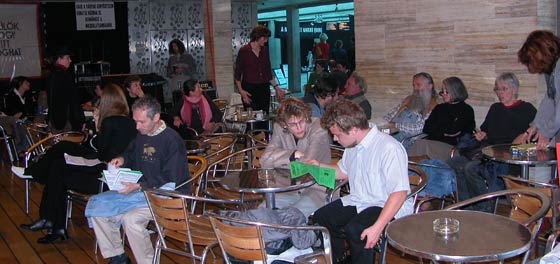Short summary of the press conference:
Júlia Klaniczay, managing director of Artpool Art Research Center after welcoming the guests and introducing the participants describes the situation in which the future of Artpool Art Research Center became uncertain due to the lack of financial support for its operation. She emphasizes that with the closing of Artpool the only research place of the progressive Hungarian underground culture from the early 1970s till today could disappeare. Moreover, the publications, manuscripts, photos, sound and video material as well as art documents could become inaccessible for decades, therefore the festival’s aim was to draw attention to the seriousness of the situation.
Júlia Klaniczay summarized the history of Artpool from its foundation in 1979, through its institutionalization in 1992 with the help of the Municipality of Budapest to the decrease of the City’s financial support. These trends concluded in the situation in which in 2005 the existence of Artpool became uncertain. She argued that for the basic operation of Artpool yearly 30-35 million forint is needed, but there is no chance to make a long-term financial scheme with the National Cultural Fund of Hungary. For this reason – as Klaniczay stated – besides the goal of finding funding for Artpool’s current financial deficit is to initiate negotiation with the Ministry of Culture on the long-term support of this field of research.
Dóra Maurer added that Artpool is more than a research institute, because besides its basic functions it is able to facilitate those young artists who are interested in the margins of the art scene.
András Török was emphasizing that for years Artpool was surviving by practicing self-exploitation, but this strategy reached its limit. He argued, that although he works to foster private donors and the business sector for artistic philanthropy, Artpool represents a so special niche of arts that due to its speciality should be state financed.
Endre Szkárosi highlighted that Artpool does not only archive and research the non-mainstream art of the 1970s and 1980s, but also documents its current tendencies. Moreover Artpool makes many of its materials available online, and has a high international prestige too. According to him Artpool is among the ten best archives in the world. Besides these Szkárosi talked about Artpool’s educational function, because it is offering grants for early career art historians, and teaching them research and archiving methodology.
